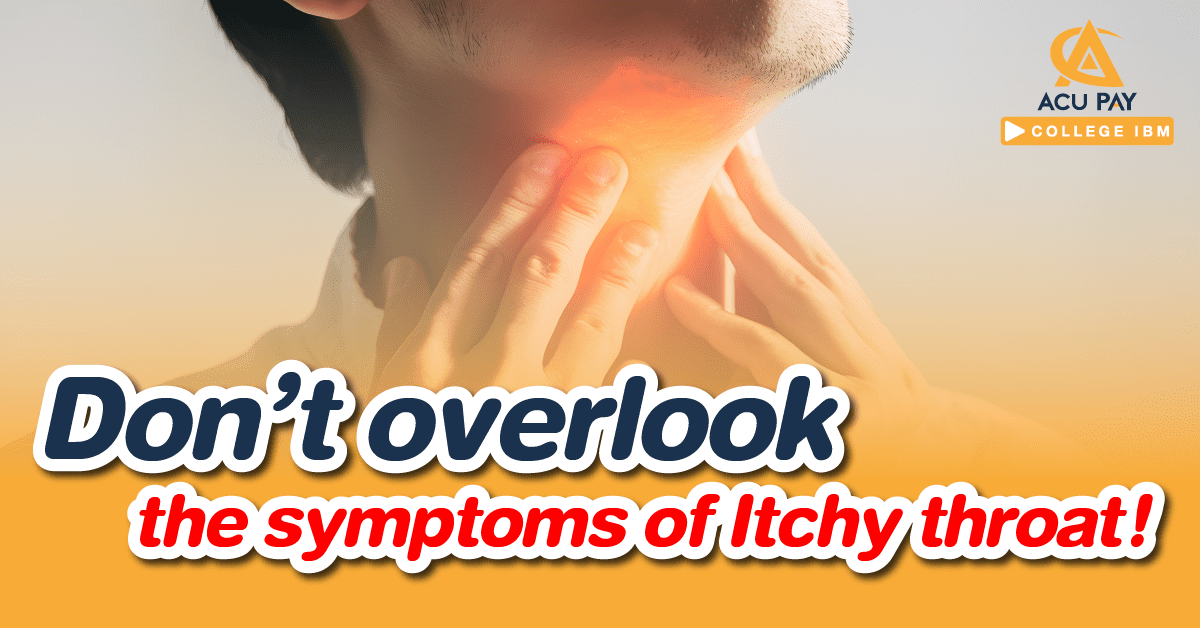

Itchy throat is a symptom that feels itchy and irritable inside the throat, causing frequent utter aham or coughing or even chronic coughing. It is a common symptom of allergies or can be a sign of illness such as Pharyngitis, flu, or sinusitis. In some cases, it can be caused by inhalation of substances or pollutants that cause throat irritation, which causes itchy throat.
Complications of itchy throat depend on the cause. Most causes are caused by allergies, which can cause complications such as;
The doctor will diagnose the itchy throat, starting with history taking and asking about the symptoms of the patient, including daily life. For example, patients may have an itchy throat after going out which means that the patients may be allergic to dust or pollen outside their home. If a doctor suspects that the patient may be allergic to food, the doctor may have the patient record the foods they eat and the abnormal symptoms that occur after eating them.
In addition, doctors will examine the neck to check for symptoms such as swelling, redness, phlegm, signs of inflammation, and sinus or nasal mucus. Other tests include:
Allergy Doctors will give you an allergy medicine that is more effective in treatment than an allergy medicine sold at pharmacies for those who buy drugs by themselves but the allergy does not improve. Doctors may recommend changing the way you live your daily life, such as cleaning your bedroom to remove dust or dirt or having patients avoid allergens, which are different for each person.
Drugs that are commonly used to treat allergies are such as Diphenhydramine, Loratadine, Fexofenadine, and Bilastine.
Food allergy An allergy-specialized doctor will diagnose and test to confirm what kind of food the patient is allergic to. Then, have the patient avoid eating that kind of food and be careful about eating or checking the ingredients in the food every time.
Drug allergy If a drug allergy is found, which usually occurs after about an hour of use, it may cause symptoms such as rashes on the skin, urticaria, itching, fever, shallow breath, or wheezing, you should go to see a doctor immediately. The doctor may treat the initial treatment by discontinuing the use of the drug, giving an Antihistamine or Corticosteroid, or injecting an Epinephrine to cure Anaphylaxis.
Flu Doctors may prescribe Decongestants in conjunction with Nasal Irrigation to reduce symptoms of phlegm flowing down the throat.
Sinusitis The doctor will give you antibiotics, along with decongestant, mucolytic, and Nasal Irrigation to help relieve phlegm and reduce phlegm in the throat.
The itchy throat can be prevented by avoiding the stimulation that causes allergies or protecting yourself from infection, which can cause colds, sore throat, or other infections that cause the itchy throat. Primary self-care can be done, such as
An itchy throat is a symptom that bothers you a lot, you may utter aham or cough just so you can clear your throat. Everyone should always stay healthy. Since the frequent weather changes, pollution is experienced every day, which is another thing that triggers an itchy throat. Anyone with symptoms of itchy throat, please don’t wait to get better on your own. You should see a doctor or follow our instructions. However, you should see a doctor first to know what’s going on, and getting medication is a good way.

ให้ทุกเรื่องการเงินเป็นเรื่องง่าย เริ่มต้นวันดีๆ ไปกับเรา MAKE A GREAT DAY WITH ACU PAY